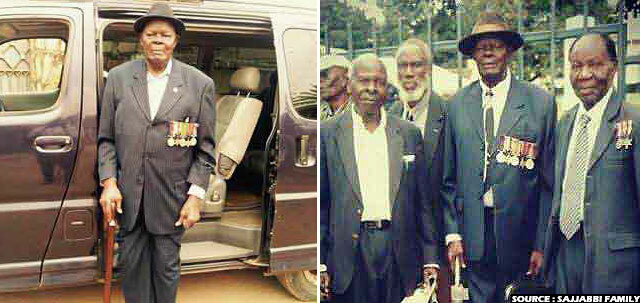Ugandan WWII veteran who died at 110 was a clan leader
Aug 21, 2017
Shortly before his death, he was serving as the treasurer of Uganda Ex-servicemen Association.

(Photo credit: Family of Mzee Stanslaus Sajjabbi Kavuma)
DEATH
Mzee Stanslaus Sajjabbi Kavuma (pictured), who died on August 13 this year at the age of 110, was a clan leader of the leopard clan in Buganda Kingdom.
The World War II veteran passed away at his son's home in Bunamwaya, Wakiso district.
Sajjabbi is survived by 29 children, 83 grandchildren and 41 great-grandchildren.
Among his grandsons is Ugandan rapper Babaluku, born Silas Babaluku Balabyekkubo.
According to his son Bishop Grivus Musisi, who is the senior pastor at Prayer Palace, Kibuye, Sajjabbi was born on August 15, 1907 in Bugerere.
He died two days after turning 110.
During the Second World War, the Ugandan veteran fought in Burma (now Myanmar) and retired with a military rank of sergeant.
His family said Sajjabbi used to share memories from the war with his sons. He used to haul guns heavier than him up the hills on orders of his superiors and sometimes even fall back in the process from being frail.
The darker times were when he witnessed some of his colleagues shot dead during the war.
'Nationalist in words and actions'
Sajjabbi was the father to fallen renowned evangelist John Deogratius Balabyeko who died in a road accident.

In his early years, Sajjabbi was a merchant in cotton and coffee before turning to keycutting along Burton Street in Kampala in the 1970s.
Shortly before his death, he was serving as the treasurer of Uganda Ex-servicemen Association.
At a vigil in Kibuye, his son, Bishop Musisi, eulogized Sajjabbi as a person with a big heart towards people no matter their background. "The late has been a people person who loved without discriminatory tendency," he said.
"Mzee Sajjabbi was a nationalist in both words and actions. I remember him giving out land in Masese in Jinja and Nakyesa Bugerere for Uganda Police to build a police post. He also donated part of his land to build this church (Prayer Palace Kibuye).
"He lastly asked us to remain as one," added Musisi.
From 1972 until 1992, Sajjabbi served as a Sultan Village chairman in Mengo Kisenyi.
And from 1986 until 1997, he led the exiled group of Baganda (Bakenyi) who had disappeared in Teso, Busoga, Karamoja and other areas and resettled them in Bugerere on free land that he surrendered.
The fallen veteran's second-last son Josh Senono Kintu Panea, said their father loved everyone, the reason he went and picked up the 90,000 Bakenyi from the various areas they had lost and brought them back in Buganda.
Among his several contributions Sajjabbi also built a palace for the Buganda king at Kayonza, Bugerere.
"We highly regard him as a gatherer and as a person who loved his kingdom," said Senono.
Sajjabbi's social life
He was a member of the then-Nankasa Group, a dance group that specialized in Ganda cultural dance (amazina amaganda).
On special days like Christmas, his children said he would slaughter cows and serve the whole village the whole season. "My father was a social man. He would strike the drum while dancing and partying with other villagers," recounts Bishop Musisi.
Sajjabbi was laid to rest mid-last week in Kayunga district.
